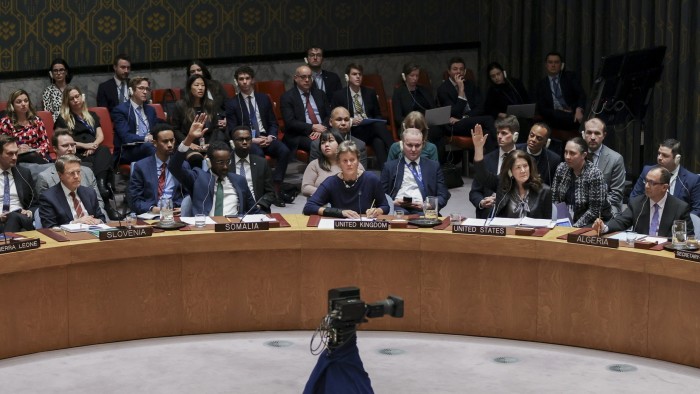Unlock the White House Watch newsletter for free
Your guide to what the 2024 US election means for Washington and the world
A US resolution calling for a “swift end” to the war in Ukraine passed the UN Security Council with the backing of Moscow and Beijing in a vote that dealt the latest blow to western unity during Donald Trump’s presidency.
France and the UK did not veto the measure, which made no mention of Russia’s aggression or Ukraine’s territorial integrity, but they abstained after failing in a last-ditch effort to delay the final vote.
The vote highlighted how the transatlantic alliance that has underpinned European security since the end of the second world war has begun to fray as the US president takes a transactional approach to foreign policy.
It marks a stark contrast to the administration of Trump’s predecessor, Joe Biden, which led a western effort to freeze Russia out of the global economy in retaliation for its full-scale invasion of Ukraine three years ago.
European capitals were blindsided this month by Trump launching bilateral talks with Moscow. He has in recent days also blamed Ukrainian President Volodymyr Zelenskyy for the three-year conflict and called for elections to be held in the country.
Shelby Magid, deputy director of the Atlantic Council’s Eurasia Center, said the abstention on the vote by France, the UK and other European countries indicated that the US and its allies would have to make an effort to find common ground.
She added that even if the vote did not mark a complete break between Washington and Europe, the symbolism was clear.
“It is stunning to see the US on the same side as these countries that we point to as in this axis of aggressors,” Magid said.
Earlier on Monday, French President Emmanuel Macron met Trump at the White House and pressed him to pledge military “back-up” for European troops that could be deployed as peacekeepers to Ukraine if a ceasefire was reached.
When asked if European troops would have American support, Trump said: “We will have a backing of some kind. Obviously, European countries are going to be involved. I don’t think you’re going to need much backing.”
UK Prime Minister Keir Starmer will also meet Trump in Washington this week in an effort to ease tensions over Ukraine and to consult on US efforts to end the war.
In another sign of the rapid rapprochement between the US and Russia, Trump on Monday said he was open to forging an “economic” deal with the nation’s president, Vladimir Putin, adding that the two countries had held “very good talks” over ending the war in Ukraine.
Senior US and Russian officials met in Riyadh last week to hold talks on normalising relations and ways to end the Ukraine war. Kyiv was excluded from the discussions.
The passage of the US measure at the Security Council marked a shift in the UN’s long-held stance on the war. Since 2022, the body has backed Ukraine’s sovereignty and territorial integrity, while noting Moscow’s aggression.
It has also called for Russian forces to immediately withdraw from Ukraine.
The final US resolution did not include language to this effect, despite efforts by France, the UK, Denmark, Greece and Slovenia to include it. American officials said they were primarily focused on getting their measure through the Security Council on Monday.
“This resolution puts us on the path to peace. It is a first step, but a crucial one, one of which we should all be proud,” the US representative to the UN, Dorothy Shea, said. “Now we must use it to build a peaceful future for Ukraine, Russia and the international community.”
France’s representative, Nicolas de Rivière, explaining his decision to abstain, said: “There will be no peace and security anywhere if aggressions are rewarded, and if the law of the jungle wins.”
Russia’s ambassador to the UN Vasily Nebenzya noted the US’s “constructive changes” in its position on Ukraine. He said Monday’s resolution was “just a starting point for future efforts towards peaceful settlement”.
Earlier on Monday, Ukraine and its European allies passed a resolution at the UN General Assembly, which included condemnation of Russia’s war in Ukraine. The US and Russia both voted against it.
Additional reporting by Leila Abboud in Paris and Max Seddon in Berlin
Read the full article here




